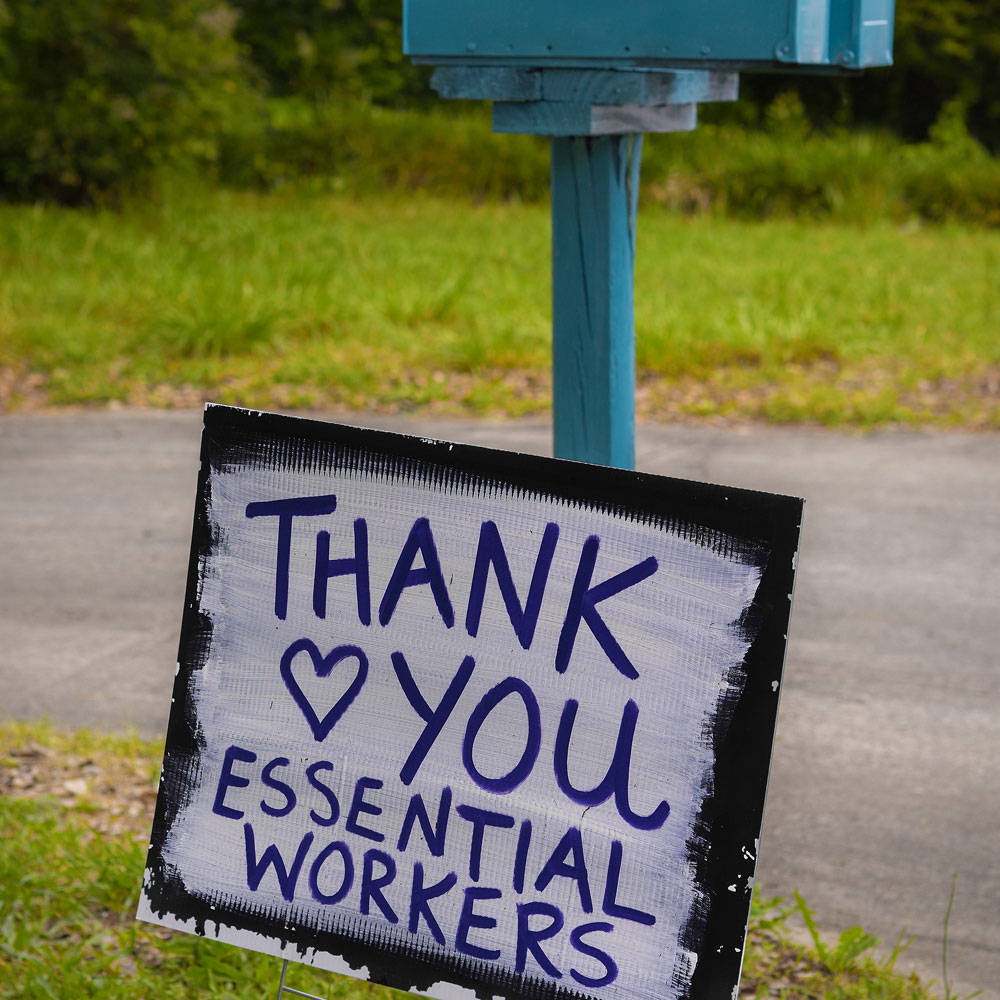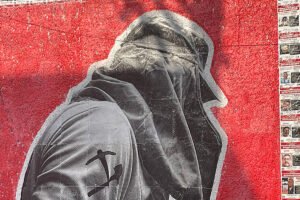

One of the many facets the pandemic has revealed to us is our nation’s tortured and conflicted position around labor and the value of work. On the one hand, workers have been labelled “heroes.” For a while, healthcare workers were cheered nightly in many cities. We glorify, as NPQ’s Ruth McCambridge notes, the “essential worker who continues to hang in there for others and themselves even as things become dangerous.”
But this country also employs seemingly indestructible narratives about the inherent worth and lack of motivation of low-income people. After all, if they were really valuable, wouldn’t they be worth more in cash terms? This justifies an ideology where the few feel themselves entitled to extract as much as possible from the many, for as little as possible. That’s the extractors’ right—and even responsibility, where shareholders are concerned. And, of course, there is also a strong racial component to this, even if (as of 2018) about 43.4 percent of those in poverty are white, as can be seen in such common tropes as welfare queens that use racist stereotypes to portray people in poverty as grifters. This cultural anchor drags many workers under in the best economic times, and these are not the best of times.
It’s this frame we see playing out in the US Senate as senators argue over how little they can safely do to support those who are unemployed in our devastated economy through no fault of their own while still having a shot at the next presidential election. Hauling out the old tropes about workers just waiting for the opportunity to sleep on the job has been effective in the past, after all, so why not now?
Both of these narratives are on display as Congress struggles to develop successor legislation to the CARES bill. Key provisions of that bill are now expiring: Last Friday, the federal eviction moratorium (which covered properties with federally guaranteed mortgages) expired and the $600 a week boost to unemployment insurance expires this Friday. And all of this happens against a backdrop of a rising death toll from the pandemic and an ongoing national anti-racism uprising that’s provoked a disturbing federal law enforcement reaction with more than a whiff of authoritarianism.
How did we get here? In May, the US House of Representatives passed the HEROES Act, but Senate Republicans sat on the bill, introducing their counterproposal, the Health, Economic Assistance, Liability Protection and Schools (HEALS) Act (the text of which, albeit written prior to the bill being renamed, can be found here) only this past Monday—after key provisions of the CARES Act began to run out.
The details of the proposal can be read in this Washington Post article. Some aspects of the bill make sense: the $1 trillion bill includes more money for a second round of the Paycheck Protection Program, another round of $1,200 per taxpayer cash payments, and about $100 billion for schools. Some measures do not make sense, but are not surprising, such as a proposal for a “liability shield to protect businesses from coronavirus-related lawsuits,” a top priority of many corporate lobbyists.
And then there are some very important things that the HEALS legislation fails to do. Not only does the bill fail to give supplemental payments to essential workers (i.e., the item that gave the “HEROES” bill its name), but, more critically, the bill includes no extension of the federal eviction moratorium in the CARES bill and no new money for state and local governments. The former is all but certain to fuel a growing eviction wave, and the latter could increase unemployment by millions (Pew reports that already state and local governments have laid off 1.5 million workers) and lead to major cuts in nonprofit contracts.
For good measure, the HEALS bill allows 100 percent of business meals to be deducted for calendar year 2020 instead of 50 percent, because…well, perhaps this is meant to help restaurants, but the item seems pointless. Yeah, we all need government subsidy for business meals these days when most indoor restaurant dining is shut down. Who is still taking business lunches these days? The measure is, however, a nice marker of who matters—and who doesn’t matter—in Washington.
Even more strangely, the bill includes $1.75 billion for a new Washington headquarters building for the Federal Bureau of Investigation. There is, apparently, always money available when a project is a pet priority—in this case, of President Donald Trump.
But perhaps the most astonishing measure is an attempt to cut back on unemployment insurance. To be fair, technically the old supplemental unemployment insurance provisions only last until July 31st, so the bill is reducing future benefits rather than cutting benefits directly. But to even consider dialing back on benefits in the middle of a pandemic, with the national death toll nearing 150,000 and an estimated 30 million out of work, including both gig workers and “regular” workers, is appalling.
Just last week, the New York Times reported that “roughly one in five workers are collecting unemployment benefits.” Surely at such a time an extension of supplemental unemployment benefits would be a feel-good measure that “both sides of the aisle”—to use that hackneyed phrase—could agree on.
So, of course, the HEALS bill offers greatly needed support to the nation’s 30 million unemployed by ensuring the continuation of those benefits in the nation’s time of greatest need. Right? No, just kidding.
In a measure beyond astonishing, Senate Republicans want us to believe that now is the time to roll back the $600 a week supplemental unemployment benefit to $200 a week. Eventually, the benefit level might go back up to as much as $500 a week, but to get that maximum benefit, the government must ensure that total unemployment insurance benefits are no more than 70 percent of normal wages…because, well, we cannot possibly let ordinary people in the US begin to believe that the government cares about their welfare. That could be dangerous. You might even end up with—dare we say it—an empowered populace!
Back in March, when the initial $600 a week supplemental insurance benefit was passed, Senator Bernie Sanders (I-VT) warned us on the floor of the US Senate that this hour would come. As Sanders said back then, while staving off efforts to strip the $600 weekly supplemental unemployment benefit measure from the CARES bill:
Imagine that somebody was making 12 bucks an hour now, like the rest of us faces an unprecedented economic crisis with the 600 bucks on top of their normal, their regular unemployment check might be making a few bucks more.… Oh my word. Will the universe survive? How absurd and wrong is that? What kind of value system is that? Meanwhile, these very same folks had no problem a couple of years ago voting for $1 trillion in tax breaks for billionaires and large profitable corporations. Not a problem, but when it comes to low-income workers in the midst of a terrible crisis maybe some of them earning were having more money than they previously made.
Sign up for our free newsletters
Subscribe to NPQ's newsletters to have our top stories delivered directly to your inbox.
By signing up, you agree to our privacy policy and terms of use, and to receive messages from NPQ and our partners.
Oh, my word. We got to strip that out.…You’re saying because poor people are down here, they don’t deserve, they don’t eat, they don’t pay rent. They don’t go to the doctor. They’re somehow inferior because they’re poor. We’re going to give them less.
It’s worth noting that, absent federal support, state unemployment insurance benefits in much of the US are paltry. (A list of state policies is available here). In Arizona, for example, the maximum weekly benefit is $240. That’s less than $1,000 a month, in one of the states being currently hardest hit by the pandemic. Try paying rent on that income. Try feeding a family.
In Florida, the maximum weekly benefit is not much better at $275. In high-cost California, supposedly a “blue state,” it is a modest $450 a week. Massachusetts has the highest maximum payment at $823 (and $1,234 a week if you have dependents), but there are a lot more states like Arizona and Florida than like Massachusetts.
Some folks in the Republican Party seem to believe that now’s a fine time to revert to the norm. More than 150 years ago, a former president of the United States named Abraham Lincoln declared—in his 1862 State of the Union address, no less—that “Labor is the superior of capital, and deserves much the higher consideration.” Alas, that was a long time ago.
Today, efforts to protect the unemployment insurance of Americans hang by a thread, even though the economic case for keeping the benefits is extremely strong. Indeed, many economic arguments could be made as to why cutting unemployment benefits is perhaps the single worst possible move that Congress could make.
Writing in the New York Times, Ben Casselman reminds us, “It isn’t just individual recipients who will suffer if the benefits are cut. The federal payments are injecting billions of dollars into the economy each week, money that flows to landlords, grocery stores, retailers, and countless other businesses. Ernie Tedeschi, a former Treasury Department official and an economist at Evercore ISI Research, has estimated that if the payments ceased, the US gross domestic product would be two percent smaller at the end of 2020 and there would be 1.7 million fewer jobs nationwide.”
And that’s just the start of the chain. As Joseph Vavra, a University of Chicago economist, reminds Casselman, cut unemployment benefits and “there’s a good chance that what is now an unemployment problem becomes a foreclosure crisis and eviction crisis”—and a housing collapse, of course, could result in contagion effects that harm—or even crash—the entire financial system.
But ultimately the question comes down to more fundamental values. Do we believe that being a member of the community that is the United States means something?
As has been noted in NPQ, too often the answer to that question has been “no.” Just since March, we have seen worker protections take second fiddle to the production of meat. We have seen workers threatened with losing unemployment insurance if they fail to go back to work, even if they fear conditions are unsafe. Now, if you whittle away unemployment insurance, then maybe you don’t have to force people off of unemployment, as economic necessity might force the issue—which is surely part of the motivation for the proposed rollback.
Of course, even as low-income Americans—many of whom are Black, indigenous, or people of color—are being asked to take market risk and risk their lives to do so, the very same bill seeks to protect wealthy white owners from the consequences of risk themselves through provisions that shield corporations from liability stemming from the health-and-safety aspects of their actions during the pandemic.
The situation seems dismal, and one doesn’t need to pretend that it is not. However, there is an alternative, and it is one that can be seen in the visions that are emerging in the popular uprising that has erupted throughout the country since the Memorial Day police murder of George Floyd in Minneapolis.
It is no secret that the level of political discourse in Washington leaves a lot to be desired. While the HEALS bill is hopelessly flawed, the HEROES bill in May that the House of Representatives passed was far from ideal. But as Arundhati Roy remarks, “Historically, pandemics have forced humans to break with the past and imagine their world anew. This one is no different. It is a portal, a gateway between one world and the next.”
So, it is time to step through that portal and begin building on the other side, a project that many, notably Black Lives Matter, are in the process of undertaking.
It is obvious that the US needs a new direction—one that revalues labor, dismantles white supremacy, and centers a sense of belonging and solidarity among all of the nation’s peoples—a society where being an American actually means something real about the value of work, community, and equity.
We all know that whatever bill emerges from Congress will be inadequate toward this broader vision. But it’s possible to set some markers. Ensuring that unemployment insurance is adequate to keep families whole—and that the value of labor, and of all workers, is respected—would be a good place to begin.











